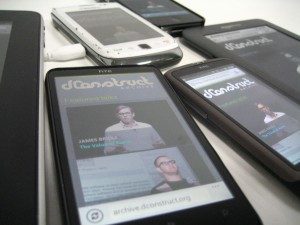 The fact is that mobile is the new… well, everything. From marketing to eCommerce, and yes, even your crisis plan needs to have a mobile component to it.
The fact is that mobile is the new… well, everything. From marketing to eCommerce, and yes, even your crisis plan needs to have a mobile component to it.
Don’t believe me?
Here are just a few stats to help you grasp the ever-growing potential of mobile:
- 75% of Americans admit to bringing their mobile phone to the washroom
- In only 1 year’s time, mobile is predicted to overtake desktop Internet usage
- Nearly half of Facebook’s 150 million daily visits come from a mobile device
- More people in the world have mobile devices than they have access to safe drinking water or electricity
- The average person spends 2.5 hours a day on their mobile devices
(Sources of these stats: here and here)
What does mobile mean for your crisis management and communications?
Simply put, it means a world of opportunity.
Consider this: If each and every one of your stakeholders owns a mobile device (which is highly probable) how can you utilize the distinct advantages of this reality in a crisis? Being set up with a mobile app, for example, would allow you to send push notifications, enable geo-targeting, send out real-time alerts of important updates and news, SMS potential, and a bunch more.
Start thinking mobile now: When incorporating mobile into your crisis management plan, analyze who your stakeholders are and what useful information or tool you can provide to them in a crisis AND on a daily basis. The best mobile strategy is one that will serve a valuable purpose in and out of a crisis. The more people who download and use your mobile app out of a crisis, will already have it and be familiar with it in a crisis.
Read: 5 Benefits of Using Mobile Apps for your Internal Crisis Communications
If you want to get ahead and truly enable your team to be able to handle a crisis situation in today’s digital world, then start thinking mobile. It’s time to incorporate a mobile strategy into your crisis management and crisis communications plan.

Author of Crisis Ready: Building an Invincible Brand in an Uncertain World, Melissa Agnes is a leading authority on crisis preparedness, reputation management, and brand protection. Agnes is a coveted keynote speaker, commentator, and advisor to some of today’s leading organizations faced with the greatest risks. Learn more about Melissa and her work here.

Preach it Melissa! Can't do it often enough. I just came back from my society's annual conference (ASSE) in Vegas. I did a general session on using social media for crisis communications and a whole day long session on Risk/Crisis Communications in general with a healthy does of digital. Got great reviews – though a smaller crowd than I would have liked, but they will catch on!
They will catch on. They have to. Slowly but surely.
Mitch Joel says it beautifully in his new book, "Ctrl ALT Delete" (a must-read by the way), that business is in purgatory right now and that companies need to realize the opportunities and realities and adapt, NOW. Those who don't won't be around in 5 years.
The best we can do is continue to educate and create awareness. With that, comes helping the smartest companies out there, which is always a treat!
Word!
Any thoughts on how to curb social media use by employees during an incident? I have told my clients that I don't want to see pictures of a burning building on their Facebook pages. I guess policy is the best way to handle it? thx
Policies, plans, education and training. Write the policies to be referred to, but the most important thing is that employees understand their roles, what's expected of them and WHY. They're all responsible adults with the business's best interest at heart (or should be), so the better educated they are, the more they understand and the less room there is for errors.
Hope this helps!